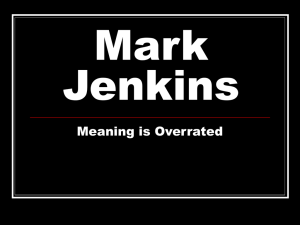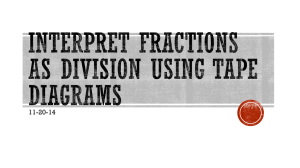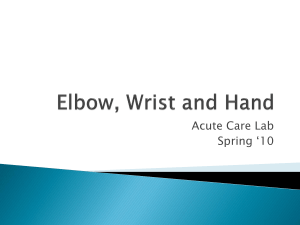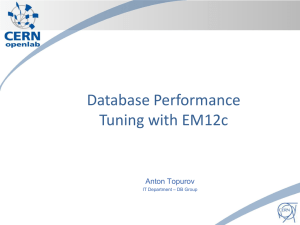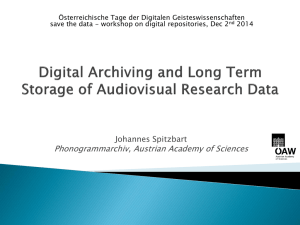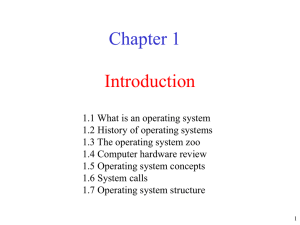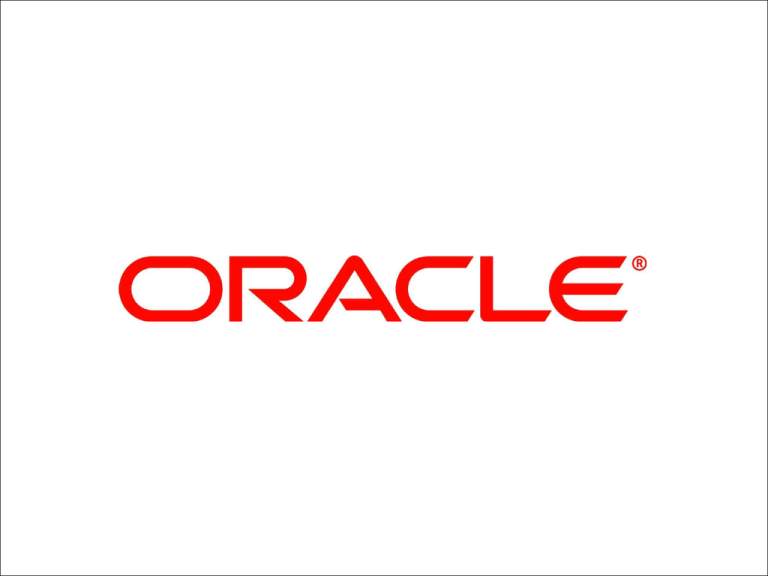
<Insert Picture Here>
The Oracle Storage Story, Now and Tomorrow
Chris Wood
Director of Product Management, Axiom LOB
A simplified History of Sun/Oracle
Storage
• In 1999 Sun acquired MaxStrat (and me in the
process) to get it’s first real RAID array. The famous
(infamous) T3. (Project Purple)
• Sun was not skilled in acquisitions; Sun managed to “incent”
90% of the MaxStrat development team to quit within the first
90 days.
• Leaving a half completed program with no skills to complete
it.
• About 2 years later the T3 finally shipped with about ½ the
features it was supposed to have and little or no RAS.
• We sold over 36,000 of them and then it started to break…
• Everything hit the fan – I got good at ducking.
If at first you don’t succeed…
• Buy another company with Magic Technology: Pirus
networks (2002)
• Pirus had a distributed architecture crossbar virtualization
engine that was supposed to do NAS, SAN, offer any to any
connectivity, rich data services, fast as all get out and be the
industries first totally virtualized array. (6920)
• Unfortunately, this did not happen and the remnants were sold
off to LSI/Engenio for pennies on the dollar
• Sun also bought LSC in 2001 and obtained SAM-QFS
but had no clue what to do with it. (The “Box” Mentality)
• Now Sun had no competitive storage offerings; Some cool
storage S/W but no idea how to exploit it, so what to do?
Give up, and OEM something that works
• Sun OEM’s “Big Fish” from HDS – The 99xx line
• Sun OEM’s “Little Fish” from LSI – The 6xxx line.
• Both products work just fine, so Sun decides to develop it’s
own UI CAM (Common Array Manager) vs. use the well
respected HDS High Command and LSI’s SANtricity.
• In keeping with past failures, CAM was universally disliked by
customers, slow, buggy and short on function; otherwise a
great product.
• There was one other problem: It’s very hard to make
money on OEM’d products – Especially if you have
daily channel conflict with your major vendor HDS.
• Now What?
Fishworks
• Sun finally asks the right question: What exactly is
storage?
• Disks and Enclosures: Commodity, low value “stuff”
• Controller Hardware: Memory (DRAM), microprocessors, I/O
ports and a ton of software – A server for instance – We make
those!
• What Glue is missing?
• File System, Volume Manager, RAID code etc. – ZFS – Gosh,
we own that also…
• Management UI – Fishworks and D-Trace Analytics
• Decision: Let’s build the Glue and tie the other parts
that we already have together – Thus was ZFSSA
born.
Today
• Oracle has two great storage offerings: Axiom 600
and ZFSSA – Similar but different, more on this later
• Oracle has the premier tape offering in the world,
hands down
• Oracle has re-discovered SAM-QFS – There’s still
nothing quite like it in the world.
• Oracle has doubled-down on storage and will
announce complete product refreshes for both the
Axiom and the ZFSSA at Oracle Open World with
availability this year. Sneak peak coming.
Agenda
• TAPE
• ZFSSA
• AXIOM
• SAM-QFS
Jim Cates on Tape…
His response to my comment: “the SL8500 is really cool”
• The T10000C tape drive is also another fairly sophisticated product. The
tape is 5 microns thick and we do fast search down tape at about 12
m/s (26 mph). The drive writes ~ 3 micron data tracks on tape at roughly
11 mph to a placement accuracy of tenths of microns. We place 3584
tracks on 1/2 inch tape using 32 data channels operating in parallel.
• Oracle designs everything for this drive including the recording head film
stack, servo pattern, tape path, rd/wrt channels, compression/encryption
algorithm, analog/digital chips, etc.
• We arguably control the largest breadth of dimensions associated with
a product. The recording heads have films measured in angstroms. The
media length is about 1 kilometer. This is a difference of about 13
orders of magnitude.
• The rise time of the head and channel is specified in nanoseconds. The
media shelf life is 30 years. This difference spans 17 orders of
magnitude.
• CW Comment: Tape is way cool!
But Tape is Dead…
• Every analyst says tape backup is declining – And
they are correct!
• D2D (VTL’s etc) are winning: Faster, Deduplication, Sex
Appeal, whatever.
• Then along came Government Regulations,
Politicians and Lawyers. Thank God!
•
•
•
•
•
Data retention policies
Searchable Archives
Project “Carnivore”
Big Data
Mobile Devices
• All that stuff, that nobody will (or should¹) read has to
go somewhere
¹Privacy?
Why Tape: Economics of Tiered Storage
• Tape is the Foundation: Most of the Data Stored at the Lowest Cost
5%
15%
Current (7-30 days) : Flash/Performance Disk
• Frequent changes
• Immediate access
• Instantaneous protection
Recent (30-90 days) : SAS/SATA
• Infrequent changes
• modifications change classification to
“Current”
• Slight access delay acceptable
Archival (>90 days) :
Tape
• Very infrequent / no changes
80%
• Offsite / offline / nearline protected
Result: Tape is growing,
Backup is not
Analysts: Digital Archive Market
Tape is the largest tier
Archive Capacity and Revenue: 2009-2017 (EB and $M)
• Storage for archive and
retention is a $3B Market
growing to over $7B in
2017
• Use case for archive
storage is becoming
distinct from primary or
backup use case
• Tape is established as
primary storage tier for
long-term archive
retention
IDC Market Analysis. Worldwide Archival Storage Solutions Forecast: Archiving Needs Thrive in an Information-Thirsty World. (IDC #230762)
Press: Tape
“Archive, legislation, need for off-site data storage, disaster
recovery, dealing with massive data quantities all mean there is a
place for tape. Even as semi-primary storage, tape can have a role
to play.”
Clive Longbottom in Dave Bailey’s column, Computing
“(Tape) gives true offsite vaulting for disaster recovery, and requires
much less power and cooling. We believe tape will remain viable for
the foreseeable future.”
Robert Amatruda, IDC, in Iain Thomson’s column, V3
Oracle StorageTek Tape Portfolio
• Best scalability
• Best reliability and availability
• Best TCO and investment protection
SL8500
We Make
Entrya
lot of Stuff!
SL3000
Software
Device Management
SL150
Data Management
Tiered Storage
Virtualization
LTO
T9840
T10000
VLE
VSM
Encryption
Oracle’s Broomfield, Colorado Campus
225,000 square feet, $70M+ Labs, Over 50 ISV partnerships
Oracle Tape Portfolio Investment (last 2 years)
• More innovation than ever… with more to come!
• Increased
investment in
tape R&D
• Our strongest
portfolio ever
• Innovation from
integration of
Oracle software
with StorageTek
hardware
Making Tape Reliable for the Long term: Proactive Monitoring
Oracle StorageTek Tape Analytics Software
• Simplify Tape Management
• Tape Analytics monitors all your drives and
media so you can focus your resources
elsewhere
• Leverage Intelligent Analytics
• Oracle’s proprietary algorithms provide
proactive health indicators that can be
trusted
• Worry Free Deployment
• Tape Analytics gathers performance data
through the library without ever entering
your live data path
• Grow with Peace of Mind
• A monitoring application that scales to meet
your needs, Tape Analytics supports
monitoring multiple globally dispersed
libraries from a single interface
17
LTFS
WHAT IS IT?
WHAT MAKES STORAGE
SELF DESCRIBING?
When a file and the index that
describes that file are stored
together
INDEX
A SELF DESCRIBING
STORAGE FORMAT
FILE
SELF DESCRIBING
WHAT IS UNIQUE
ABOUT SELF
DESCRIBING FILES?
WHY DO WE WANT
FILES TO BE
ACCESSIBLE?
TWO REASONS:
1 - Easily share files
2 - Retrieve files in the future
Self Describing Files are
independent of the OS and the
software used to create them
WHY DO WE WANT
SOFTWARE
INDEPENDENCE?
Freedom to access files
without proprietary
software
INDEX
SOFTWARE
DEPENDENT
FILE
TAR Format on Tape
LTFS with LTO
…FILE(S) 2
FILE(S) 1
FILE(S) 2…
FILE(S) 3
INDEX 3
FILE INDEX
INDEX 2
End of Tape
Beginning of Tape
INDEX 1
FILE
LTFS Format on Tape
INDEX 2
INDEX 3
FILE INDEX PARTITION
FILE PARTITION
FILE 2
FILE 1
FILE 3
End of Tape
Beginning of Tape
INDEX 1
Oracle’s Open Format Software
Oracle’s StorageTek LTFS,
Open Edition Software
• First LTFS Driver To Support:
• StorageTek T10000C,
LTO-5, & IBM LTO-5
• Oracle’s Driver is Free
HP
https://oss.oracle.com/projects/ltfs/
So What’s Missing?
How Does LTFS-LE Expose a standard
Interface to Tape Libraries?
APPLICATIONS
Visibility Into All The Files in a Tape Archive
All File Indices Stored
Within LTFS-LE
Application
POSIX /
CIFS / NFS
Interface
File Index and
Files Stored
Locally on Every
LTFS Tape
INDEX 1
INDEX
1
INDEX 2
FILES
INDEX 3
LTFS Library Edition
Agenda
• TAPE
• ZFSSA
• AXIOM
• SAM-QFS
ZFS Storage Appliances
Fastest Growing Major NAS and Unified Storage Vendor
7420
7120
SINGLE
CONTROLLER
7320
48GB DRAM
4 CPU cores
2 PCI slots
73GB of Flash
Scales to ~200TB
SINGLE OR
DUAL CONTROLLERS
S7420
ZFS Intelligent Operating System
Single storage software.
Three unique storage systems.
288GB DRAM
16 processor cores
2 PCI slots
Scales to ~6TB Flash
Scales to ~500TB
7420
ACTIVE-ACTIVE
CONTROLLERS
2TB DRAM
80 processor cores
10 PCI slots
Scales to ~15TB Flash
Scales to ~3PB
Engineered for Extreme Performance.
Most Horsepower Possible
Dynamic Storage Tiering (HSP)
2TB DRAM
4TB Read Flash
10TB Write Flash
10/15K
SAS-2
4 Write SSDs per Tray (max)
80 cores processing power
7.2K
SAS-2
10/15K
SAS-2
Automated, real-time data migration from DRAM
to multi-class flash, to multi-class disk storage.
Only software engineered for multi-level
flash and disk storage.
New New
SPC-1
OLTP
New New
SPC-2
DSS/OLAP
NetApp (3270)
IBM (V7000)
NetApp (3270)
Oracle (7320)
3.1GB/s
4.8GB/s
2.5ms response
101,183
134,140
7.4GB/s
Oracle (7420) – DECEMBER 2013
Oracle (7320)
New
Oracle (7420)
IBM (V7000)
Oracle (6780)
IBM (XIV)
17GB/s
325,000
267,000
400,000
15GB/s
275,000
4.3ms response
10.7GB/s
137,066
Oracle (7420) –
Oracle (7420)
137,066
137,066
137,066
Oracle (7420) – DECEMBER 2013
53,014
62,261
Oracle (6780)
IBM (V7000)
68,035
NetApp (3270)
Oracle (7420)
Oracle (7420) – JULY
Oracle (7420) – DECEMBER 2013
8S ZFS Storage Performance Benchmarks
Leading Disk Storage Performance in
All Three Industry Benchmarks
Sources:
SAN: storageperformance.org
NAS: spec.org/sfs2008/
SPECsfs
Caution: Not for External Us
Power of Storage Analytics
Real Time Visibility
• Based on Solaris Dtrace
• Enables Storage Admins to see various
statistics / measurements in real time
• Provides drilldown analysis
• Visibility of who/what is using storage
resources
• Most powerful tool for troubleshooting and
resolving bottlenecks
Agenda
• TAPE
• ZFSSA
• AXIOM
• SAM-QFS
Introducing the Pillar Axiom 600
The Core Value Propositions
Pillar Axiom 600 : Oracle’s Axiom lowers IT costs and speeds up ROI with advanced Quality
of Service, simple data management, and industry leading utilization and scalability.
• Easy to Use Enterprise Storage:
Data and storage services that can be promoted or demoted “on
the fly” to increase or decrease performance and priority as
business and application priorities change.
• Scalable and Elastic:
Ideal storage platform for virtual infrastructure projects, IT data
center consolidation projects, Oracle deployments, and bringing
business-critical applications, such as financial and OLTP, online
with the highest levels of performance without tradeoffs for capacity
utilization.
• Industry leading Efficiency:
Utilization, Performance, and Protection – tied to unique service
levels. Consolidate your applications on a single storage platform.
Pillar Axiom 600 Storage System
Axiom 600 – one model that linearly
scales both capacity and performance
SINGLE ACTIVE-ACTIVE
SLAMMER
with ONE BRICK
Up to 4 ACTIVE-ACTIVE
2 Control Units
13 Drives
12TB Capacity
SLAMMERS with 64 Bricks
48GB Cache
S7420
All models include…
8 Control Units
Up to 832 drives
Up to 1.6PB Capacity
192GB Cache
128 RAID Controllers
SATA, FC, or SSD Storage Classes
Patented Quality of Service (QoS) Software
All Protocols: FC, iSCSI, CIFS, NFS
All Management Software: Multi-Axiom Management, Application Profiles, Thin
Provisioning, Storage Domains, Path Management Software
Data Protection and Mobility Software: Replication, Volume Copy, Clones
Engineered integration with Oracle software: HCC, OEM, ASM, SAM, OVM
29
Top Technology Differentiators
Feature
Function
Quality of
Service
Application prioritization and
contention management that
enables multiple applications to
efficiently co-exist on the same
storage system
Modular
Architecture
Distributed
RAID
Ability to dynamically scale
both performance and capacity
by independently adding
Slammers (up to 4) and Bricks
(up to 64)
Achieves superior scalability
and performance even during
drive rebuilds by moving RAID
local to storage enclosures
Benefits
Applications are assigned I/O
resources according to their
business value and not relegated to
‘first come first served’
Increases overall efficiency and
utilization of the storage system
Maximum performance/utilization
regardless of size of configuration.
Ability to grow and rebalance the
storage pool based on changing
business environments
Ensures predictable performance
scaling with capacity add.
Higher reliability by localizing the
drive rebuild process to the storage
enclosure and reducing RAID
rebuild window
Axiom Architecture
Prioritizing the I/O Queue; Breaking the FIFO Model
Premium
Medium
Low
Virtual
Machine 1
Virtual
Machine 2
Virtual
Machine 3
Align Virtual
TheServer
Business Value
Of The
Application
4
5
7
8
1
3
2
6
9
10
FIFO
Queue
To I/O
Performance
Typical
Levels
Multi-Tier Array
Premium
Medium
Virtual
Machine 1
Virtual
Machine 2
Low
Virtual
Machine 3
Virtual Server
4
5
7
8
1
3
2
6
9
10
Premium
Priority
Queue
Medium
Priority
Queue
Low
Priority
Queue
Extending QoS w/ Storage Domains
Create up to 64
Physical Domains
in a Single Axiom
Domain 2
Domain 1
• Refresh Legacy or Aging Bricks
without Disruption
Easily and non- disruptively evacuate old
drives
• Isolate Application Data or
Workloads to Physical Location
Secure a workload to a domain - No comingling of data across media
Domain 3
• Separate User Groups or
Departments to Physical
Location
Secure department or user type/role data to a
domain
• Separate Protocols
Isolate SAN and NAS workloads – they can be
very different.
32
Modular Scaling with Modular Components
Bricks
Slammer
Slammer
Pilot
SAM-FS with Axiom
Complete Solution with Oracle WebCenter Content
WebCenter Content Servers
Metadata Server
•
•
•
•
•
QFS File System
SAM Copy 3
SAM Policies
Metadata
Thousands of SAN clients
Hundreds of file systems
Billions of files
Petabytes of disk cache
Exabytes of archive
SAM
SSD
Offsite SAM
Copies
Copy 1 & 2
Primary File
System
FC
SAM Disk
Archive Copy
SATA
Performance Disk
Capacity Disk
SAM Tape
Archive Copy
Tape Systems
Remote Systems

